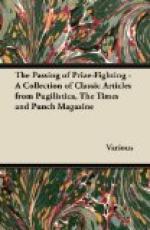We heard the “Macbeth choruses” exquisitely performed, and saw the concluding combat furiously fought at this theatre. This was all, appertaining unto Macbeth in which we could detect a near approach to the meaning and purpose of the text, except the performance of the Queen, by Mrs. H. Vining, who seemed to understand the purport of the words she had to speak, and was, consequently, inoffensive—a rare merit when Shakspere is attempted on the other side of the Thames.
The qualifications demanded of an actor by the usual run of Surrey audiences are lungs of undeniable efficiency, limbs which will admit of every variety of contortion, and a talent for broad-sword combats. How, then, could the new Macbeth—a Mr. Graham—think of choosing this theatre for his first appearance? His deportment is quiet, and his voice weak. It has, for instance, been usually thought, by most actors, that after a gentleman has murdered his sovereign, and caused a similar peccadillo to be committed upon his dearest friend, he would be, in some degree, agitated, and put out of the even tenor of his way, when the ghost of Banquo appears at the banquet. On such an occasion, John Kemble and Edmund Kean used to think it advisable to start with an expression of terror or horror; but Mr. Graham indulges us with a new reading. He carefully places one foot somewhat in advance of the other, and puts his hands together with the utmost deliberation. Again, he says mildly—
“Avaunt! and quit my sight! Let the earth hide thee!”
in a tone which would well befit the situation, if the text ran thus:—
“Dear me, how singular! Pray go!”
When he does attempt to vociferate, the asthmatic complaint under which he evidently labours prevents him from delivering the sentences in more copious instalments than the following:—
“I’ll fight—till—from my bones—my flesh—be hacked!”
We may be told that Mr. Graham cannot help his physical defects; but he can help being an actor, and, above all, choosing a part which requires great prowess of voice. In less trying characters, he may prove an acquisition; for he showed no lack of judgment nor of acquaintance with the conventional rules of the stage. At the Surrey, and in “Macbeth,” he is entirely out of his element. Above all, let him never play with Mr. Hicks, whose energy in the combat scene, and ranting all through Macduff, brought down “Brayvo, Hicks!” in showers. The contrast is really too disadvantageous.
But the choruses! Never were they more be_witch_ingly performed. Leffler sings the part of Hecate better than his best friends could have anticipated; and, apart from the singing, Miss Romer’s acting in the soprano witch, is picturesque in the extreme.
* * * * *
HOP INTELLIGENCE
Fanny Elsler has made an enormous fortune by her trips in America. Few pockets are so crammed by hops as hers.




